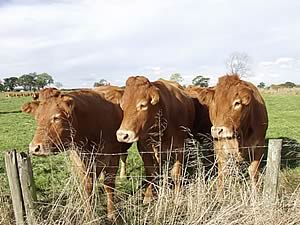 |
|||||||||
|
|||||||||||||||||||
|
|
Taking
the guesswork out of beef breeding 21/01/06 Gene markers which influence traits like meat tenderness and carcase quality are set to become a main stream breeding tool, north pedigree and commercial beef farmers were told at a meeting in Carlisle.
Extensively used in other livestock producing countries, including the US, France and New Zealand, Merial Animal Health's Igenity testing service brought gene markers, which identify specific genetic traits, to the UK and the meeting in Carlisle at the Shepherd's Inn on Wednesday (January 18) was its first main introduction to breeders. Held in conjunction with leading pedigree auctioneers Harrison & Hetherington who invited both pedigree and commercial beef farmer clients to the meeting, it was attended by around 50 people. Igenity's head in Europe, Nigel Otter told the meeting: “Gene markers are becoming a main stream breeding tool in the UK. “They are being used extensively in other countries - for example France has a major programme evaluating the genes involved in meat eating quality. In the States, where it is also widely used, sale catalogue entries are backed up by gene markers.” Mr Otter said while until now beef breeders had only been able to select for traits such as growth rates and leaner, more muscled carcases, now this new science enabled them to be able to breed specifically for the eating quality of the animal's carcase. The naturally occurring protein calpain influences meat tenderness post-mortem by weakening muscle fibres and the test identifies variations in animals' calpain genotype, rated on a scale of one to five on their ability to produce tender meat. “Meat tenderness excites the supermarkets and it is the number one priority for beef. They want to improve the quality of the eating experience and they want this quality to be much more reliable and consistent. In this way gene markers for beef will have influence throughout the food chain, particularly amid competition from tender meats such as chicken,” said Mr Otter. The gene marker for carcase quality identifies the protein leptin which influences feed intake and fat deposition, and it further enhance information already available on levels of fat deposits, carcase weight and rib eye size. Knowing an animal's leptin genotype allows breeders to make more informed management decisions regarding breeding, nutrition and management. Much of the work in the field of gene markers for beef cattle has been carried out in the US, in particular at one of the main beef reference establishments in the world, the Meat Animal Research Centre in Nebraska. Igenity with the National Beef Association has carried out a study - as yet unpublished - with six UK pedigree beef cattle societies, funded by Genesis Faraday in Edinburgh, to look at tenderness and carcase traits. During the last year Igenity has carried out 2,000 of the tests in the UK which by DNA fingerprinting gives breeders access to the genetic make-up of their cattle, allowing more objective breeding decisions to be made. Mr Otter said the test simply involved taking a few strands of the animal's tail hairs. The DNA is then extracted from the hair follicles in the laboratory and is then analysed for the presence of gene markers. Kits of 10 tests cost £30 per animal. The ideal would be to test the top two thirds of both males and females in a pedigree beef herd. Igenity has its store set on a panel of up to 90 different gene markers which would include meat traceability from farm to plate. “For breeders it's going to be an important marketing tool - for both pedigree and commercial producers. If supermarkets and leading retailers are prepared to pay a premium for tenderness, then there's a big incentive for breeders to use it,” said Mr Otter. “By selecting for superior tenderness breeders can make very fast progress over two generations,” he added. * Merial is a world-leading, innovation-driven animal health company, providing a comprehensive range of products to enhance the health, well-being and performance of a wide range of animals. Merial employs approximately 5,000 people and operates in more than 150 countries worldwide. Its 2004 sales were in excess of $1.8 billion. Merial Limited is a joint venture between Merck & Co., Inc. and sanofi-aventis. For more information, please see www.merial.com
|
||||||||||||||||||

|
|
||||||||||||||||||
| home | agri-services | pedigree
pen | news | dairy | beef | machinery property | organisations | site map |
|||||||||||||||||||


